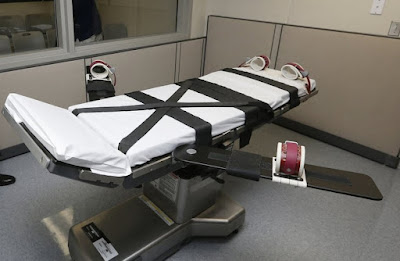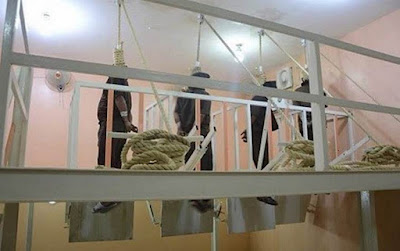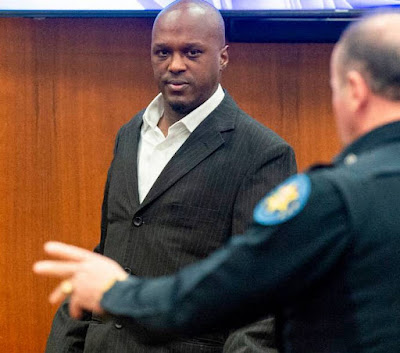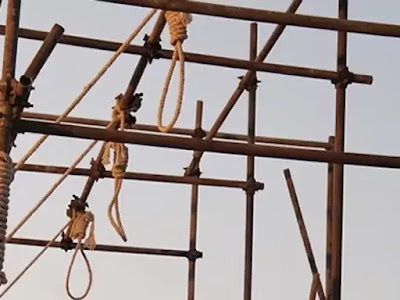Ronnie Lee Gardner's date with the firing squad has spurred a group of people opposed to the death penalty to no longer remain silent.
Utahns for Alternatives to the Death Penalty organized as a judge signed Gardner's death warrant in April. It includes 9 religious denominations, a couple of organizations and more than 160 individuals who've registered at the coalition's website.
The group opposes the death penalty, contending it is expensive, ineffective, arbitrary and discriminatory. Furthermore, it fails to meet the needs of victims' families, risks being imposed on innocent people and conflicts with religious beliefs.
"We oppose capital punishment not just for what it does to those guilty of horrible crimes, but for how it affects society," says Bishop John C. Wester, of the Catholic Diocese of Salt Lake City, a founding member of the group.
Coalition members are calling for a moratorium on further executions in Utah while an independent commission studies capital punishment.
Ralph Dellapiana, a Salt Lake attorney who heads the group, said UTADP intends to incorporate as a nonprofit organization.
"We're in it for the long haul," Dellapiana said. "It's not just the Ronnie Lee Gardner case."
The group drafted a position paper outlining its basic beliefs:
• The death penalty is a failed policy that is extremely expensive and ineffective.
• The death penalty system doesn't help the families of victims.
• Maintaining a death penalty diverts resources that could be spent on truly effective crime prevention and detection activities.
• The death penalty is applied in an arbitrary and discriminatory manner that is socioeconomically, geographically and racially biased.
• Many innocent people have been condemned to die.
• People in the United States and throughout the world increasingly reject the death penalty.
• A death penalty system violates the moral codes of Utah's religious communities.
• Life without the possibility of parole is the current alternative to the death penalty, and it works effectively both to punish offenders and protect society at a fraction of the cost of the death penalty system.
"As Christians we condemn the taking of human life, recalling that Jesus himself was the victim of state-sponsored murder, said Bishop Carolyn Tanner Irish of the Episcopal Diocese of Utah. "His death holds before our eyes the poverty of capital punishment and its capacity to dehumanize those who carry out its sentence. We yearn for the day that justice is neither retributive nor vengeful."
Source: Deseret News, June 16, 2010
Corrections officials deny Ronnie Lee Gardner request to be interviewed by Larry King
Condemned killer Ronnie Lee Gardner now will not do any media interviews prior to his anticipated execution, the Utah Department of Corrections says.
The department previously had said Gardner would not be available for interviews, a decision based, in part, on Gardner's stated desire not to speak to the press, said prison spokesman Steve Gehrke. Other considerations included security and a desire to avoid glorifying Gardner's crimes and further harming his victims.
Gardner earlier Wednesday expressed his desire to appear on CNN's "Larry King Live" to discuss creating an organic farm to help troubled youths. Corrections executive director Tom Patterson agreed to review the request, which included contacting King's producers.
Producers for the show expressed interest for a telephone conversation with Gardner on Wednesday evening. However, upon full review and considering all pending security concerns, the corrections department reaffirmed its decision not to allow any interviews, to ensure the safety and security of the prison facility, Gehrke said.
Prison officials had agreed to allow an interview after Salt Lake attorney Jeff Hunt filed a request on behalf of the Deseret News arguing that prohibiting interviews was a violation of Gardner's First Amendment rights.
Gardner told the Deseret News he wanted to be interviewed by the newspaper, but then told Patterson on Wednesday that he wanted to be on King's TV program.
On Tuesday, Gardner enjoyed his requested last meal. Contrary to some reports, however, his friends and family said he is not fasting for the remaining hours to his scheduled execution at midnight Thursday night/Friday morning.
A friend of Gardner who spoke with the inmate Wednesday told the Deseret News that he just wanted to enjoy his preferred last meal without the stress that will likely accompany Thursday's events leading up to the
execution.
Source: Deseret News, June 16, 2010
Firing squad -- Method has garnered international attention.
If all goes as expected, Ronnie Lee Gardner will take his place in history Friday as the 3rd person in the nation to die by firing squad since the U.S. Supreme Court reinstated the death penalty in 1976.
He could also be the last -- or one of the last -- in the nation to be executed that way in the United States.
Utah is the only state still using shooters, and only the four men on death row who initially selected the firing squad before the state eliminated it in 2004 could still choose bullets over lethal injection.
40 of the 50 men legally executed in Utah since 1852 have been killed by firing squad, according to Weber State University criminologist L. Kay Gillespie. 6 were executed by hanging -- an option along with beheading under Utah's 1st capital-punishment law -- and 4 by lethal injection.
When lawmakers were debating the use of firing squads in 2004, then-Sen. David Thomas, R-South Weber, said the firing squad had been an effective method since statehood and supported keeping it. But he was outvoted, with some legislators citing the publicity that surrounds firing squad executions.
The last Utah inmate to die by firing squad was John Albert Taylor in 1996, who said he selected the method to embarrass the state. His death made international headlines.
Before Taylor, Gary Gilmore ultimately chose to die by bullets rather than lethal injection. Gilmore's crimes and execution spawned the book The Executioner's Song and a television movie of the same name.
The state Attorney General's Office has said it could have argued Gardner, 49, did not have the right to switch back to firing squad but decided not to dispute his choice.
The other death-row inmates who initially picked firing squad are Ron Lafferty, Ralph Leroy Menzies, Troy Michael Kell and Taberon Dave Honie.
Source: Salt Lake Tribune,June 16, 2010
Utah execution reopens death-penalty debate
As the nation again turns an eye toward Utah and its preparations for an execution by firing squad, capital-punishment proponents insist death is the only just penalty for the worst crimes. For opponents, questions persist.
Gary Gilmore earned Utah a special place in history when his 1977 execution by firing squad reopened the door to capital punishment in the United States.
The practice has remained problematic ever since.
Otherwise, Ronnie Lee Gardner — sentenced to die for the 1985 courthouse slaying of attorney Michael Burdell — wouldn't have spent 25 years on Utah's death row.
Most countries and 15 states, as well as the District of Columbia, have found the death penalty untenable and abandoned it.
Now, as the nation again turns an eye toward Utah and its preparations for Gardner's scheduled execution by firing squad early Friday, capital-punishment proponents insist death is the only just penalty for the worst crimes.
For opponents, however, questions persist: Is the death penalty administered arbitrarily? Is justice served when inmates languish for decades? Can states afford to spend the millions of dollars capital cases require? And does the death penalty deter crime and lead to a better society?
Is it fair?
The Supreme Court halted capital punishment in 1972, convinced the penalty had been applied arbitrarily in the case of Henry Furman, who shot a Georgia homeowner during a burglary. The same concern will end the
practice again, opponents maintain.
They say one well-known Utah case — that of Dan and Ron Lafferty — highlights the uneven way the death sentence is applied.
The brothers were convicted of the July 24, 1984, homicides of Brenda Lafferty, their sister-in-law, and her 15-month-old daughter, Erica, in American Fork, 30 miles south of Salt Lake City. Ron Lafferty awaits execution; his brother is serving 2 life terms.
They were tried separately. Unlike Ron, Dan represented himself at trial. Two jurors refused to give Dan the death penalty, although he claimed he slit the victims' throats.
"The law is not very good at specifying who should live and who should die," said Franklin Zimring, a law professor at the University of California, Berkeley.
Zimring was among those who recently persuaded the American Law Institute — an association of about 4,000 lawyers, professors and judges — to abandon its support of the death penalty based on arbitrary application.
The institute was the force that led the Supreme Court in 1976 to reinstate the death penalty in Gregg v. Georgia. The group established a legal framework of aggravating and mitigating factors to standardize the death penalty.
Without the backing of the institute, the death penalty has lost its "intellectual underpinnings," said Roger Clark, a law professor at Rutgers University. "We have to compare crimes and criminals, and we just can't do it very well. The jury makes the call, but the criteria (upon which they make their decision) doesn't make sense."
Should it take so long?
In some cases, such as that of the mother and stepfather charged in the May torture killing of 4-year-old Ethan Stacy in Utah, society demands execution, said Kent Scheidegger, director of Sacramento-based Criminal Justice Legal Fund.
"There are some crimes for which any lesser penalty is not justice," he said.
Although Scheidegger contends there is no way to make capital punishment "completely consistent," he said the system does "by and large only sentence the worst killers to death."
For capital punishment to be effective as a deterrent, he said, states must streamline the appeals process. As an example, Virginia has limited the number of appeals in capital cases to an automatic appeal followed by a second review. An execution date is set immediately if they both are denied, forcing inmates to turn to federal courts, according to the Office of the Virginia Attorney General.
Behind Texas, Virginia has executed more people since capital punishment was reinstated than any other state. Virginia's 5-year average from sentencing to execution compares with a national average of 11 years, according to Northern Illinois University.
But streamlining capital cases could be even more expensive because more attorneys and judges would be needed, Salt Lake City civil-rights attorney Brian Barnard said. The time it takes to execute someone can't be blamed on defense attorneys, he said.
Death-penalty appeals are dealt with painstakingly, he said, and that takes time.
"When society is imposing something that is irreversible, the judicial system says we must be careful because (death penalty) mistakes are irreversible," Barnard said.
And mistakes have been made. The Death Penalty Information Center points to the exoneration of 138 death-row inmates since 1973.
Like most death-penalty proponents, University of Utah law professor Paul Cassell would like the time between conviction and execution to be reduced. Otherwise, he said, the death penalty works well in this country and is structured to be lenient, not barbaric.
"We could make the death penalty apply evenly, but if it's applied evenly, everyone who commits murder gets the death penalty," he said. "The sorting is done by the jury."
Does it improve society?
The last person executed in Utah was Joseph Mitchell Parsons, put to death in October 1999 for the 1987 murder of California resident Richard Ernest.
Then-Iron County Attorney Scott Burns sought the death penalty because, he said, the crime was especially heinous: Parsons robbed Ernest and stabbed him more than a dozen times with a screwdriver.
Ernest had picked up the hitchhiking Parsons in California. The pair were near Parowan in southern Utah when Parsons attacked Ernest and took his car and credit cards.
"My thought was to let a jury decide whether he deserved the death penalty," said Burns, now director of the National District Attorneys Association. "It's a difficult thing. I carry it with me every single day."
Ernest's sister, Jana Salais, witnessed the execution by lethal injection.
"It's justice, but it's not fair," Salais said. Parsons deserved a brutal death, she said. "(But) he just laid there and went to sleep."
Like the rest of the country, the families of Gardner's victims have mixed views on the death penalty.
Kirk's widow and daughters say they can't rest until Gardner has been executed. Donna Nu, Burdell's fiancée, says she would do anything to stop Gardner's execution. Otterstrom's widow, Kathy Potter, and son, Jason Otterstrom, have not weighed in.
"I don't know which path should be followed, but our family needs peace," Otterstrom said last week. "I ask that whatever decision is reached, that it be permanent."
Source: Salt Lake Tribune,June 16, 2010 - Photo: Utah State Correctional Facility
Utah needs a death penalty debate
With the hourglass running down to the execution of Ronnie Lee Gardner, we urge the good people of Utah to examine their majority commitment to capital punishment as a just, moral and practical means of government-sanctioned punishment.
For we are far from alone in asserting that it is none of those things. The evidence supporting our view is not only persuasive but has, over time, become virtually incontestable.
Yet, as a state we continue to embrace an archaic, unfair and notoriously fallible practice in which the most notorious convicted murderers pay their debt to society in a specie that we have determined has no inherent
value.
Capital punishment, compared to lifetime incarceration, is far more expensive. The cost of public defenders trained to handle death penalty cases, years of legal appeals, and the burden on the judicial system far exceeds the tax dollars necessary to house an inmate in a maximum security cell block for life. It is this fact alone that has motivated some of the 15 states that have abolished capital punishment and roughly a dozen others that are considering doing so.
But the economics of the death penalty are secondary to the moral and human cost of retaining a system that has always been unevenly applied. It is beyond argument that racial minorities and the poor are much more likely to face execution than whites from the middle and upper classes. It also is widely acknowledged that executions have no deterrent value.
Since 1994, when the national number of death penalty cases rose to an annual high of 328, that rate has fallen by 63 % to the lowest number since the Supreme Court reinstated capital punishment in 1976. Much of that decline can be attributed to the high-profile impact of cases in which DNA evidence has later exonerated death row inmates, many of whom were sentenced to be executed on the basis of eyewitness testimony.
It is impossible to know how many wrongfully convicted inmates have gone to their deaths, but the Death Penalty Information Center puts at 129 the number of those who have been released from death row since 1977 based on new evidence.
Ronnie Lee Gardner murdered 2 people in 1985. But that fact really is not germane to whether we should retain capital punishment. In deciding that question, we should ask ourselves this question: Do our outrage and natural desire for revenge alone justify retaining a broken and bankrupt system?
Source: Editorial, Salt Lake Tribune, June 16, 2010
Inmate set to die by firing squad asks high court to stay execution
A Utah death row inmate who would become only the 3rd person to die by firing squad in the United States in 33 years appealed to the Supreme Court on Wednesday, seeking a last-minute stay of execution.
Ronnie Lee Gardner's lawyers filed the first of what are expected to be several appeals to the justices. He is scheduled to be put to death early Friday for the shooting death of attorney Michael Burdell during a botched
escape attempt from custody in 1985 at a Salt Lake City, Utah, courthouse.
Among the claims the 49-year-old prisoner raises in his appeals is that he has been a death row inmate too long.
"He asserts that executing him now, after nearly 25 years on death row in Utah, so lacks retributive or deterrent value that it violates the Eighth Amendment," Andrew Parnes, Gardner's lawyer, told the high court. He did not return phone calls from CNN seeking comment.
Gardner's lawyers have launched an aggressive scramble in state and federal courts, as well as the Utah Board of Pardons and Parole, to at least postpone the execution.
A federal judge late Tuesday refused to block it, after Gardner claimed the procedures related to a two-day commutation hearing held by the board last week violated his civil rights. Parnes had argued the clemency hearing was not fair and impartial because representatives from the Utah attorney general's office were both presenting the state's case at the hearing and advising the board. Attorneys representing the state agency said safeguards were in place to prevent a conflict of interest.
The parole board Monday refused to commute Gardner's sentence to life in prison, and the Utah Supreme Court on Tuesday also denied his request for a stay. He claims he is a changed man, and should not be executed for his crimes.
Gardner is set to become the third person to die by rifle fire, all in Utah, since the Supreme Court restored the death penalty in 1976. He had a long history of escapes and was slipped a gun before he fatally shot Burdell on April 2, 1985. He was at the courthouse for a pre-trial hearing in the 1984 slaying of Melvyn Otterstrom, who was killed at the Salt Lake City bar where he was working to earn extra money.
The execution is set for just after midnight (2 a.m. ET) at the Utah State Prison in Draper, about 20 miles south of Salt Lake City.
Corrections officials announced Gardner had consumed his last meal Tuesday night at 6:30 p.m., and has elected to fast prior to the anticipated execution.
During the commutation hearing, parole board members heard testimony regarding Gardner's childhood, which was punctuated by poverty, abuse and neglect. Parnes maintained that jurors in the Burdell trial never heard this evidence -- and presented affidavits from jurors who said it might have persuaded them to decide against the death penalty.
Life in prison without the possibility of parole was not an option for jurors at the time, and Parnes said it was suggested to the jury that Gardner might be released from prison at some point if he were given a life sentence. Gardner pleaded guilty to 2nd-degree murder in Otterstrom's death, and jurors were not told of a judge's recommendation in that case that he not be released from prison, Parnes said.
Utah is the only state that uses the firing squad as a current execution method. Oklahoma allows it only if lethal injection and electrocution are ruled unconstitutional. 40 of Utah's 49 executions in the last 160 years or so have been done this way, according to the Death Penalty Information Center.
State lawmakers made lethal injection the default capital punishment in 2004, but at least three inmates who already had chosen the firing squad were grandfathered in under the new law.
5 anonymous marksmen will use matching .30-caliber rifles, standing behind a wall cut with 5 gunports. One of the rifles will be an "ineffective" round, similar to a blank, which delivers the same recoil as a live round. That ensures none of the riflemen will know who delivered the fatal shot.
The marksmen fire from a distance of 25 feet. The inmate is blindfolded, strapped to a chair and a target pinned to his chest.
Lethal injection remains by far the most-used execution method in the United States and is the primary or only option in the 35 states with capital punishment. 9 states still use electrocution, 5 states have the gas chamber, and 2 -- Washington and New Hampshire -- would hang condemned inmates as an alternate method.
The Supreme Court case is Gardner v. Utah (09-11378).
Source: CNN.com, June 16, 2010
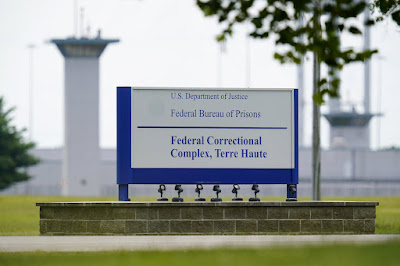


.jpg)

